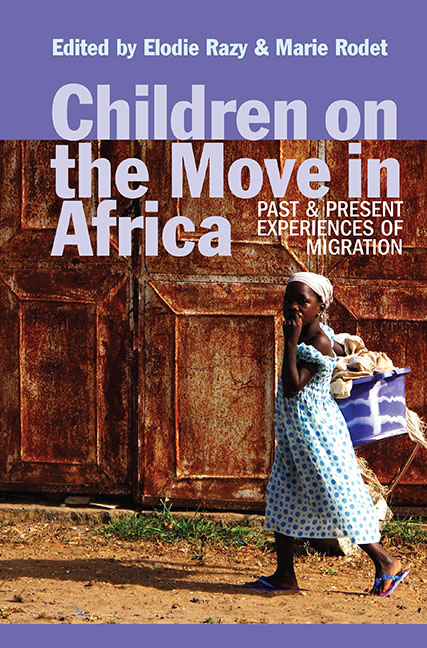Book contents
- Frontmatter
- Contents
- List of Illustrations
- Notes on Contributors
- Preface
- Acknowledgements
- Introduction: Child Migration in Africa: Key Issues & New Perspectives
- Part I CHILD MIGRANTS IN AFRICA: BEYOND THE DILEMMA OF VULNERABILITY v. AGENCY
- 1. ‘An Ardent Desire to be Useful’: Senegalese Students, Religious Sisters & Migration for Schooling in France, 1824–1842
- 2. Girl Pawns, Brides & Slaves: Child Trafficking in Southeastern Nigeria, 1920s
- Part II BEING A CHILD & BECOMING A GENDERED ADULT: THE CHALLENGES OF MIGRATIONS IN CHILDHOOD
- Part III MOBILITY, IMAGINATION & MAKING NATIONS
- Bibliography
- Index
1. - ‘An Ardent Desire to be Useful’: Senegalese Students, Religious Sisters & Migration for Schooling in France, 1824–1842
from Part I - CHILD MIGRANTS IN AFRICA: BEYOND THE DILEMMA OF VULNERABILITY v. AGENCY
Published online by Cambridge University Press: 25 October 2017
- Frontmatter
- Contents
- List of Illustrations
- Notes on Contributors
- Preface
- Acknowledgements
- Introduction: Child Migration in Africa: Key Issues & New Perspectives
- Part I CHILD MIGRANTS IN AFRICA: BEYOND THE DILEMMA OF VULNERABILITY v. AGENCY
- 1. ‘An Ardent Desire to be Useful’: Senegalese Students, Religious Sisters & Migration for Schooling in France, 1824–1842
- 2. Girl Pawns, Brides & Slaves: Child Trafficking in Southeastern Nigeria, 1920s
- Part II BEING A CHILD & BECOMING A GENDERED ADULT: THE CHALLENGES OF MIGRATIONS IN CHILDHOOD
- Part III MOBILITY, IMAGINATION & MAKING NATIONS
- Bibliography
- Index
Summary
In April 1824, Mother Anne-Marie Javouhey, the founder and Mother Superior of the Catholic Sisters of Saint-Joseph of Cluny, wrote to France's Minister of the Marine and Colonies, seeking his support for an idea that she had long entertained. She proposed to ‘raise’ and educate African boys and girls, aged eight to 10 years, at the Saint-Joseph house in Bailleul-sur-Thérain, France, teaching them academic subjects, manual or domestic skills and religion. She would choose her pupils from among those children in the care of the French government in Senegal. The boys, who would live separately and receive their education from the chaplain, she wrote, would become ‘priests or teachers, according to their dispositions; the girls could become nuns or secular teachers for Africa’. She asked the Minister to permit her to move forward with this programme, and to ask the Government to cover the costs of transportation. The Minister responded positively to Javouhey's request and, though his response was more measured, the Governor of Senegal also supported it. Accordingly, 11 children travelled from Senegal to Bailleul-sur-Thérain in the spring of 1825. They were joined in May 1827 by 10 children, and by one more in the summer of 1828.
Though Javouhey hoped eventually to have 35 young Africans in her school, she never reached her goal, in part because of the health problems the students encountered in France. Indeed, a quick succession of deaths from tuberculosis in the early 1830s raised serious questions about the programme and produced a controversy surrounding the future of the children already resident in France. This controversy – which involved the sisters, government officials, parents and the young people themselves – is the subject of this chapter. When they received word that Senegalese children had fallen sick and that several had died in France, frantic parents and relatives sought the immediate return of their young loved ones. Student opinions were split, with some agreeing readily to return home and others professing a strong desire to remain, even if this went against the wishes of their families. The sisters helped organize the return of some students, but advocated for others who wanted to remain in France to complete their schooling.
- Type
- Chapter
- Information
- Children on the Move in AfricaPast and Present Experiences of Migration, pp. 31 - 50Publisher: Boydell & BrewerPrint publication year: 2016



